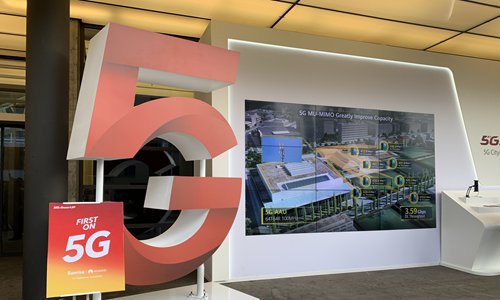HOME >> BUSINESS
Huawei wins most 5G contracts in Europe
By Chen Qingqing in Zurich Source:Global Times Published: 2019/10/15 19:38:40
Chinese firm gains ground amid pressure from Washington

A 5G sign displayed at the entrance to MBBF19 at the Messe Zürich exhibition center. Photo: Chen Qingqing/GT
Telecoms giant Huawei Technologies has been advancing steadily in Europe, its key 5G market outside China, in spite of a murky political climate. The company has signed more than 60 5G contracts worldwide, mostly in Europe.
The company has been maintaining steady growth in 5G, with more than 60 contracts and shipment of more than 400,000 base station modules, Huawei 5G Product Line President Yang Chaobin told a panel on Tuesday during the Global Mobile Broadband Forum (MBBF), which runs from Tuesday to Wednesday in Zurich, Switzerland.
Europe has become the largest 5G market for Huawei outside China, where the company has 32 5G contracts, followed by the Middle East with 11 and the Asia-Pacific with 10, the senior executive said.
5G has been ramping up faster than expected. With ultra-low latency and fast speed, the next generation of wireless technologies has generated tremendous opportunities across many industries. By the end of 2019, there will be more than 60 5G commercial networks across the world, Ken Hu Houkun, rotating chairman of Huawei, said at MBBF.
The Chinese company and Swiss operator Sunrise signed a deal ahead of MBBF to established a joint innovation center in Switzerland, the first of its kind in Europe, tapping into more applications empowered by 5G. Huawei plans to open more such centers in Europe, Hu said.
Meanwhile, the latest German rules leave the door open to Huawei, which, some analysts said, indeed show that the company is not a threat.
The EU released a report on risk assessment of 5G networks last week, without specifying Huawei as a potential risk for 5G roll-out in the region, although it cited state or state-backed actors as one of the threat actors.
Huawei has reiterated that it is a private company fully owned by its employees.
"We have been working with Europe since the 3G era, maintaining the relations with European carriers. And half of our 5G contracts are from the European market, reflecting our long-term commitment to the market," Yang told the Global Times, commenting on Germany's and the EU's latest stance of not excluding Huawei from 5G roll-outs.
Huawei has expanded its footprint across Europe, and countries such as Switzerland, Germany, Italy, France and Monaco have made commitments to work with the Chinese company.
"Current developments are very positive for Huawei, and they help rebuild and strengthen its position in Europe in the 5G era," Neil Shah, an industry analyst at global technology industry research company Counterpoint, told the Global Times on Tuesday.
Operators have realized that Huawei infrastructure offers good quality and is cost-effective, while there is no clear proof or negative precedent on backdoors, which have become a major factor in helping more and more European carriers resist US pressure, the analyst said.
Huawei forecast that there will be 200 million 5G users next year, and the number would surge to 500 million in 2021.
The GSMA, the global trade body, said there have been 125 use cases in the 5G era, including AR/VR, CCTV surveillance, public safety, mobile banking and others. With the use of 5G technologies further deepened, more use cases would be explored with the support of regulators and wide-ranging collaboration across industries.
"Huawei has been supplying access network kits to European fixed and mobile networks for more than 15 years. If there were backdoors, they would have been uncovered by now," Kevin Curran, a professor at Ulster University, told the Global Times on Tuesday.
Within the 400,000 base station modules, 300,000 shipped after May 16 when the US imposed its Entity List, Huawei has shipped base stations without US-originated components, which have no difference in terms of performance with those containing US components, according to a Huawei senior executive.